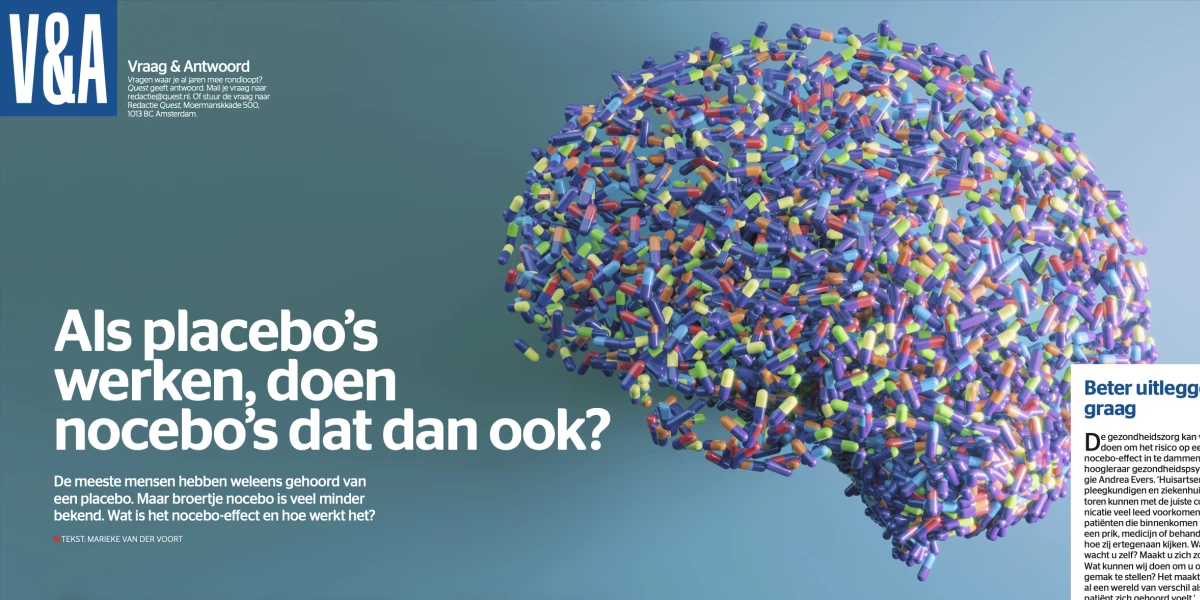If placebos work, do nocebos work too?
When people think of placebos, they are quick to think of experiments in which some subjects receive a real drug, while others receive a fake drug. However, even a fake drug can have positive health effects, as many studies have shown. As long as subjects believe the drug makes them better, that signal goes to the brain and fewer symptoms are experienced: the so-called placebo effect.
Sick-making side effects leaflet
The nocebo-effect may be lesser known, but also exists and works exactly the other way around. In this case, people expect that a drug will make them sick. If they then take it, they start to feel worse. After all, the brain has received the signal that the pill is likely to make them sick, weak and nauseous. 'You then notice an anxiety and stress effect in the brain, so to speak,' says Professor of Health Psychology, Andrea Evers of Leiden University. 'Think, for example, of an increased cortisol response.' Cortisol is produced during stress. If this persists for a long time, it can lead to sleep problems, headaches, obesity and depression, among other things.
The nocebo-effect frequently occurs when people read a side-effects leaflet, Evers continues. ‘Reading about the possible negative effects can raise concerns. Even if the side effects are very few and the beneficial effect of the drug is proven to be large. The tension in advance is so high that people no longer dare to take any medication at all, or pass up on getting a vaccination. During the corona pandemic, for example, we saw a relatively large group who were so afraid of possible side effects, that they refrained from getting a shot in advance.
Nocebo is everywhere
Fear of medication is one thing. But the nocebo-effect goes much further than that. 'We study it in the medical context. But the nocebo-effect plays a role daily in all areas of our lives. At home, at work, during a job interview and when meeting other people unexpectedly,' says Evers. 'Suppose you go outside and think: that neighbor doesn't like me. Then when he doesn't look very friendly, you start to believe that this is really so. While he might just be having a bad day. And if during a job interview you expect the interviewers to think badly of you, a difficult question or a critical look will immediately confirm that idea. So the chances of you getting the job only decrease.' There is a nocebo-effect present during both the neighbor interaction and the job interview. In the brain, this is similar to the fear of side effects of a medication.
Half empty becomes half full
Anxious people and people that worry often are especially susceptible to the nocebo-effect. What does Evers advise them to do? ‘In whatever area the nocebo-effect manifests itself, try to gain confidence. Are you afraid of a vaccination because you are convinced it is going to hurt a lot? Then take someone with you, tell the doctor and ask them to take your fear into account. Are you dreading a job interview? Get coaching and prepare together. Instead of just focusing on what you are so afraid of, it can help to concentrate on what you want to achieve with something. For example, that you get the vaccine to stay healthy for as long as possible, or that you go to that job interview in order to get your dream job.' If by doing this you manage to see the glass half full a little more often, the nocebo-effect will have less of a chance.
Explain better please
Health care can do a lot to curb the risk of a nocebo-effect, says Professor of Health Psychology Andrea Evers. "General practitioners, nurses and hospital doctors can prevent a lot of suffering with the right communication. Ask patients who come in for a shot, medication or treatment how they view it. What do they expect? Are they worried? What can they do to put them at ease? It often makes a world of difference when a patient feels heard. The explanation a doctor gives while prescribing a medication is also crucial, according to Evers. Is someone afraid of the side effects? Research shows that there are fewer nocebo-effects if a doctor explains that 95 percent of people do not suffer from side effects, rather than indicating that five percent do. 'Our brain literally reacts to what we hear. Are told that most people don't get symptoms? Then we tend to think we belong to that group. Do we hear that a small part does experience side effects? Then we fear that we are in that group.

